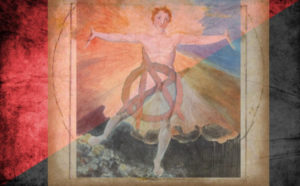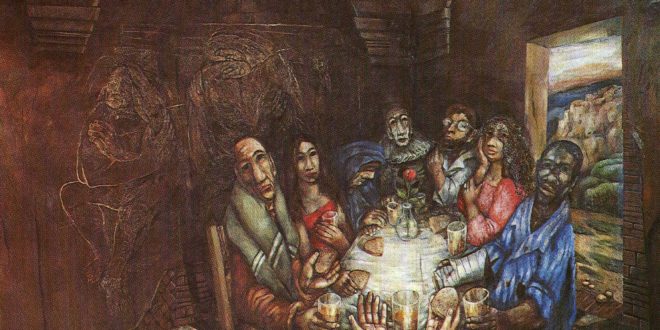Podcast: Play in new window | Download (Duration: 59:01 — 81.0MB)
 It’s the holiday season, a time of encounter with religious traditions even for the most secular people. This year, the COVID-19 pandemic and the murder of Black men and women by police has highlighted socio-economic inequity, the violence of the state, and the need for new forms of life that do not rely on police, prisons, and social violence. As we approach Christmas, we’re asking ourselves: what can we learn from the branches of Christianity that have imagined non-violent ways of living, ways of living that are based on community care and mutual aid?
It’s the holiday season, a time of encounter with religious traditions even for the most secular people. This year, the COVID-19 pandemic and the murder of Black men and women by police has highlighted socio-economic inequity, the violence of the state, and the need for new forms of life that do not rely on police, prisons, and social violence. As we approach Christmas, we’re asking ourselves: what can we learn from the branches of Christianity that have imagined non-violent ways of living, ways of living that are based on community care and mutual aid?
From the Franciscan monastic tradition to the Christian Anabaptists, some Christian practices have charted ways of living together that emphasize responsibility and duty to each other and a collective exit from the violence of government and concentrated, sovereign power.
It would seem inevitable that we must repudiate one of the two, either Christianity with its love of God and one’s neighbor, or the State with its armies and wars. ~ Leo Tolstoy
The work of Italian philosopher and political theologian Giorgio Agamben helps us think through the ways that the “rights” of some citizens are predicated on the exclusion of other people from access to those rights. Agamben invokes the concept of “bare life” to describe life that is managed by the state but not granted the full rights associated with citizenship. Bare life belongs to those who are most marginalized.
Agamben and the Christian anarchists ask fundamental questions: what does it mean to live together in a society? How do we form strong communities that are inclusive of the most marginalized people, when we live in a fragmented world? Is state enforcement of community ties the only way that diverse groups of people can co-exist? And if our current state is not up to this task, does this mean we need a revolution that will create one?
Christian anarchists and Agamben both say no. They not only critique the nation state paradigm, they also endeavor to imagine new forms of community that are not situated in relation to a state. They seek to imagine forms of communal belonging that go beyond the idea of being a citizen, beyond the conversation of state-granted rights.
Today, episode producer Nick Bergen talks with Katrina Kniss about her work on Agamben and the Christian anarchist tradition, exploring some of their common themes such as the need to think beyond revolution, and voluntary exile from the state through the abdication of rights. They also discuss how these ideas might help us think through the political turmoil that we have witnessed throughout the past year.
 GUEST
GUEST
Katrina Kniss is a graduate student at Wake Forest University, where she is working on a dual degree in divinity and law. She does research at the intersection of Christian anarchism and the work of Giorgio Agamben.
RELATED
Beyond Revolution, Beyond the Law: Christian Anarchism in Conversation with Giorgio Agamben by Katrina Kniss (paywall)
Keeping the Devil’s Company (Interchange with Adam Kotsko on Political Theology)
Blessed Are the Peacemakers: The Radical Pacifism of A. J. Muste (Interchange)
 MUSIC – David Bazan (The Passion of David Bazan)
MUSIC – David Bazan (The Passion of David Bazan)
“Hard to Be” (Curse Your Branches, 2009)
“Foregone Conclusions” (Pedro the Lion, Achilles’ Heel, 2004)
“Level with Yourself” (Strange Negotiations, 2011)
“Both Hands” (Blanco, 2018)
“I Heard the Bells on Christmas Day” (Dark Sacred Night, 2016)
CREDITS
Producers: Nick Bergen, Bradi Heaberlin
Host: Bradi Heaberlin
Edit and Mix: Doug Storm
Executive Producer: Kade Young
 WFHB Bloomington Community Radio
WFHB Bloomington Community Radio


